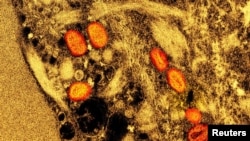Barely 48 hours after the World Health Organization declared mpox a global health emergency, Nigeria went on high alert Friday, announcing new mpox cases and raising concerns about the country’s ability to contain the outbreak.
The Nigeria Center for Disease Control and Prevention, or NCDC, said it has recorded 39 cases of mpox so far this year amid a surge in infections across Africa. No deaths have been recorded in Nigeria.
Bayelsa, Cross River, Ogun and Lagos states are the most affected by the outbreak.
Speaking at a news conference, NCDC lead Dr. Olajide Idris said that the nation is ramping up its response to manage the spread of the virus and prevent the disease from being imported.
Mpox is a rare viral zoonotic disease, meaning it is primarily an animal disease that can be transmitted to humans. It is endemic in several African countries, with over 2,800 cases reported across 13 countries this year, claiming more than 500 lives.
Symptoms include fever, body aches, weakness, headaches and rashes.
With a more lethal strain emerging, Idris said that vaccination plans are being considered for high-risk populations.
"The Nigerian government is making effort to make vaccines available to the public, especially for the hotspot areas,” he said. “These vaccines have been shown to have a favorable safety profile. They are not yet in the country, but they are on their way."
Olayinka Badmus, deputy project director for Global Health Security, Breakthrough Action Nigeria, said the new strain poses a higher risk.
"This particular strain is new, and anything new requires new learning. The things that we have seen related to this particular strain is the fact that it is spreading quite fast, the presenting symptoms — especially the rash — are widespread,” she said, meaning that the rash is all over the body.
“We are also seeing more children affected with mpox compared to the other strains,” Badmus said.
Another cause for concern, she said, is that this strain has "a higher human-to-human transmission at an accelerated rate."
Badmus stressed the need for public awareness in containing the spread and urged people to seek medical attention if they experience symptoms.
“We encourage everybody feeling feverish, muscle pain, sore throat to please visit the nearest health care facility," he said.
Public health experts are also urging people to adhere to preventive measures such as avoiding contact with potentially infected animals and practicing good hygiene.





